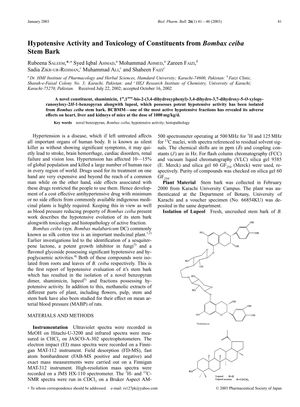Hypotensive Activity and Toxicology of Constituents from Bombax ceiba Stem Bark.
January 2003
in “Biological & Pharmaceutical Bulletin”

TLDR Bombax ceiba stem bark extracts can lower blood pressure, but high doses can be toxic and lethal.
In 2003, researchers discovered that the methanolic extract of Bombax ceiba stem bark, particularly a novel compound named shamimicin, and lupeol, exhibited hypotensive effects in Sprague-Dawley rats and NMRI mice. The most potent hypotensive activity was observed in the plant's flowers and pulp extracts. The study revealed that the hypotensive action of certain extracts was mediated by muscarinic M2 receptors and endothelium-derived relaxing factor, as evidenced by the negated effect in rats pretreated with atropine sulfate. However, shamimicin did not significantly lower blood pressure at a dose of 15 mg/kg. The extract BCBMM was effective in reducing mean arterial blood pressure by 50% at a dose of 30 mg/kg, and oral administration at 200 mg/kg/day led to a significant 13.2% reduction. Yet, a dose of 1000 mg/kg/day proved lethal to mice, causing organ damage and death. The study concluded that while BCBMM has hypotensive potential, its safety is dose-dependent, and further research is needed to establish safe dosages. The study's sample size was small, with only two animals per dose for the lethal dose study and three rats for the oral administration study.
View this study on jstage.jst.go.jp →
Related

research Hypotensive Activity and Toxicology of Constituents from Bombax ceiba Stem Bark.
Bombax ceiba stem bark extracts can lower blood pressure, but high doses can be toxic and lethal.